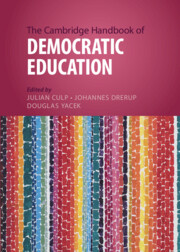Book contents
- The Cambridge Handbook of Democratic Education
- Cambridge Handbooks in Education
- The Cambridge Handbook of Democratic Education
- Copyright page
- Contents
- Contributors
- Acknowledgments
- Introduction
- Part One Historical Perspectives
- Part Two Philosophical and Normative Foundations
- Part Three Key Topics and Concepts
- 16 Educational Justice and Democratic Education
- 17 Global Justice and Democratic Education
- 18 Debate and Deliberation in Democratic Education
- 19 Agonistic Democracy and the Question of Education
- 20 Punishment and Democratic Education
- 21 Children’s Rights and Democratic Education
- 22 Education, Trust, and the Conversation of Democracy
- 23 Patriotism and Democratic Education
- 24 The Voice of Poetry in Cultivating Cosmopolitan and Democratic Imagination
- 25 Disability and Democratic Education
- Part Four Challenges
- Index
- References
19 - Agonistic Democracy and the Question of Education
from Part Three - Key Topics and Concepts
Published online by Cambridge University Press: 20 April 2023
- The Cambridge Handbook of Democratic Education
- Cambridge Handbooks in Education
- The Cambridge Handbook of Democratic Education
- Copyright page
- Contents
- Contributors
- Acknowledgments
- Introduction
- Part One Historical Perspectives
- Part Two Philosophical and Normative Foundations
- Part Three Key Topics and Concepts
- 16 Educational Justice and Democratic Education
- 17 Global Justice and Democratic Education
- 18 Debate and Deliberation in Democratic Education
- 19 Agonistic Democracy and the Question of Education
- 20 Punishment and Democratic Education
- 21 Children’s Rights and Democratic Education
- 22 Education, Trust, and the Conversation of Democracy
- 23 Patriotism and Democratic Education
- 24 The Voice of Poetry in Cultivating Cosmopolitan and Democratic Imagination
- 25 Disability and Democratic Education
- Part Four Challenges
- Index
- References
Summary
In many policies for and practices of education for democratic citizenship it is assumed that the democratic community is a community of shared democratic values. On such an account, education has the task of including “newcomers” into this community by ensuring that they adopt and internalize the common democratic values. In this chapter, I discuss the work of two authors, Chantal Mouffe and Jacques Rancière, who both have challenged this understanding of democracy and the democratic community. Both authors highlight the contested (Mouffe) and sporadic (Rancière) nature of the democratic community, thus bringing into view the work done to constitute the political community. They also highlight that this constitution does not happen before democratic politics can take place, but actually is an essential part of it. I provide a reconstruction of Mouffe’s and Rancière’s ideas and explore the implications for education.
Keywords
- Type
- Chapter
- Information
- The Cambridge Handbook of Democratic Education , pp. 311 - 327Publisher: Cambridge University PressPrint publication year: 2023
References
- 1
- Cited by

